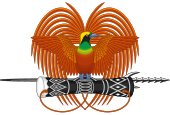Campaign
Despite threats to boycott the elections, by the time nominations closed on 4 August, both the New Guinea Islands and Papua constituencies had two candidates, and only the New Guinea Mainland constituency had no nominations, [2] although Sydney Barker's nomination for the seat arrived four minutes late. When nominations re-opened on 1 September, Barker submitted his application and became the sole contestant. [3]
New Guinea Islands was contested by John Chipper, a contractor in Rabaul, and William Thomas, a planter in Kokopo. [4] Papua was contested by Stephenson Fox, an accountant, and Vincent Sanders, a contractor. [4] Chipper and Sanders were both backed by the Taxpayers' Association and pledged to resign if requested. Barker also pledged to resign if required. [3]
This page is based on this
Wikipedia article Text is available under the
CC BY-SA 4.0 license; additional terms may apply.
Images, videos and audio are available under their respective licenses.
